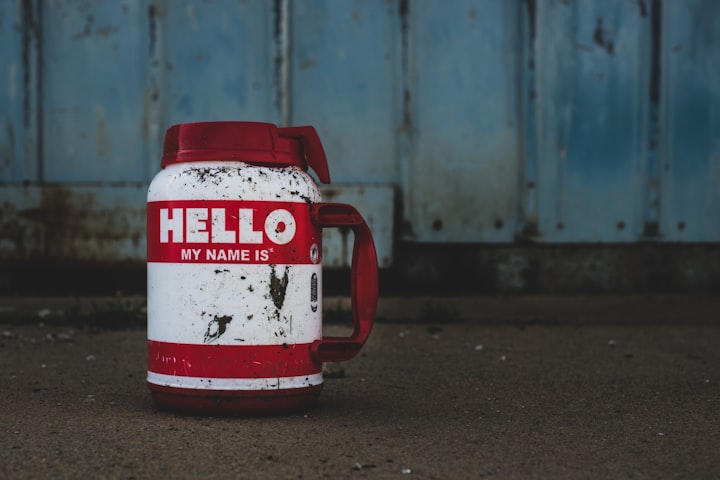Places in the World Where People’s Names Don’t Matter Much
How our identities are or aren't attached to them

What we call a rose, by any other name, would smell as sweet.
--Shakespeare
A westerner’s take on names
A person’s name always has held significance for me. Most, if raised in a Western country, probably feel the same.
Soon-to-be parents expend much effort, even prodigious research, to learn the meanings of potential names for their bundle of joy. Newborns might be named after Grandma, Dad, or a prior ancestor. Boys may be Jr., I, II, or III.
Many love their given names; others despise them. A smattering of folks legally change theirs.
I always maintained parents should give kids temporary names, perhaps valid until age 18 or 21, whereafter they can adopt it permanently or choose a substitute.
Or if religious, it could be incorporated earlier as part of a confirmation, bat or bar mitzvah, or other significant moving-into-adulthood ceremony.
Imagine looking forward to selecting your own name around the time you qualify for a driver’s license or to drink a legal beer. I can envision myself as a young girl with my best friends, kicking around all possible names we’d select. It seemed like a cool idea to me. At age sixteen, I’d have chosen Tiffany.
How many of us haven’t met a Susie who seems better suited as a Veronica or Catherine? Or a Jonathan who presents more like a Biff?
My plea growing up was: “Parents, please don’t give your kids baby names like Billy or Cindy.” Instead, make it William or Cynthia, grown-up names. Let them or circumstances of life determine diminutives.
I was christened Vicky. Then, as adolescents are often wont to do, in high school, I changed the spelling to Vicki. Later, it legally became Victoria, providing in my mind gravitas for a 20-something-year-old blonde working in a substantially older, white male-dominated profession.
The brilliance of that logic is not lost on me, now an adult. Naturally, a four-syllable moniker transformed a person into looking older than a two-syllable one.
Just further support for the thousands of studies about rational decision-making…not…by twenty-somethings. It perhaps made a difference in written correspondence and phone calls. Who knows.
Called Victoria for more than thirty years, even my family uses it. If someone calls me otherwise, they have known me since childhood. As a senior citizen now, the “baby” aspect of Vicki bothers me not in the least.
I once met a Charlemagne in Santa Barbara. True story. That’s a substantial name. His mother obviously had great aspirations for her son. Not surprisingly, he went by Charles, although he was proud to inform me of the unspellable handle.
And, is it not cruel to saddle kids — won’t they face sufficient challenges in life without a goofy name to defend — with this year’s trendy name? The one that, in twenty years, will sound archaic, daft, or just plain weird.
Then, how about the uber-cool parents imposing offspring with numbers or symbols? Won’t those adolescents be thrilled to be Y2²Z? No schoolyard taunting there.
On first meeting
Attributable to a traditional, respectful upbringing, I connect with a person by asking his or her name upon our first meeting.
Not only does it seem polite, but I enjoy the interaction of knowing an individual’s name while conversing. Whether the taxi driver, laundry lady, or fellow traveler met at a cafe, it’s an automatic inquiry for me.
Have you ever noticed how people’s faces light up when you ask their names? It’s a validation of their humanity. A connection.
Names in India
I often stumble with Asian pronunciations, especially in Thailand and India, where given names are alien to this Western brain.
On my first India trip, my initial stay was on the upstairs floor of a two-story building serving as an ashram — one of countless variations of such properties — in Tiruvannamalai in South India. Speaking of names tying the tongue, try that one. Happily, most locals call it “Tiru.”
My congenial German host settled me in and introduced me to the security guard, a familiar presence at such locations. His job was to keep a post inside the massive azure sliding metal gate of the iron fence surrounding the property.
“What’s his name,” I inquired. Since I would be seeing him regularly, naturally, I’d greet him.
“Oh, just refer to him as “Watchman” the German Fellow replied. Quizzically querying further, he explained, “No one calls anyone by their actual names here; they call them by their job titles.”
Hence, the maid was the Girl. The male staffer was the Boy. The store owner down the way was Shopkeeper. The rickshaw chap was Driver. And, he was Watchman.
Despite the custom feeling disturbingly impersonal and dismissive, I adapted, though I never became wholly comfortable with the custom. When in Rome…and all that.
I also imposed a few self-rules for this first junket.
One, repeated at least a dozen times daily, was: DO NOT BRING YOUR WESTERN JUDGMENT TO THIS CULTURE.
Yes, it’s in CAPS. It was a necessary constant reminder, at least if I didn’t wish to be the stereotypical, and sadly often deserved, Ugly American.
Hence, I never came to know any locals’ names who provided services, despite daily interactions with them for over a month. It’s just how life was. The same custom prevailed throughout the rest of the eleven states visited in south, central, and north India.
One exception, though, was when my Rishikesh shopkeeper friend Sanjeev, who became like a brother, said, “Just ask the Boy,” his employee for more than ten years. I insisted on knowing his name and always called him Arun. He became a cherished pal, regular motorcycle chauffeur, all-around sweetheart, and go-to guy.
I’m unsure of the genesis of referring to people in such a manner. A holdover from two centuries of rule by the British Raj? A longer history?
Indeed, the Indians appear to have comfortably accepted the Bard’s: What’s in a name? That which we call a rose, by any other name would smell as sweet from Romeo and Juliet. It didn’t seem to bother them in the least. Why should it concern me?
Every third Hindu is likely a Raj, Ram, Rani, or Anika. A guess of Mohammed for a Muslim male will be correct more than fifty percent of the time. Singh is the surname of all Sikhs.
Hence, a name was relatively inconsequential. All have a meaning, however, and Indians proudly explain it. There often is a religious connotation.
Mexican names
I also became accustomed to repetitive names when living in Mexico: Lupita, Maria, Juan, José, Manuel, and Miguel. When adding a property manager’s name to my phone, I was instructed to enter it as Property Manager-José since I would meet 30 more.
There, I needed initial clarification about what surname people used. All Mexicans have four names: first, middle, and both parents’ surnames. Mexico’s current leader, for example, is referred to as President AMLO from the first letters of his names.
My first introduction was the erroneous assumption that my landlady and her husband shared the same surname. No, none of the couples I met used a common last name.
It is customary to use a first name and the mother’s surname. However, when signing a formal document, all four are included, and the full-length one is on government identification cards.
Bali’s unique naming system
In Bali’s Hindu culture, the naming is even more confusing to outsiders. There are only four names. To further complicate things, women have the same first names as men.
A “Ni” before a name signifies a woman; “I” is for men. However, the naming order remains the same, except for the upper caste Brahmana, which has its own grouping.
- First Child: Wayan, Putu, or Gede
- Second Child: Made, Kadek or Nengah
- Third Child: Nyoman or Komang
- Fourth Child: Ketut
- Fifth Child: Wayan Balik wirh Balik meaning “return, again, repeat”
Hence, Ni Wayan is a woman, whereas I Made is a man.
My perplexing question was: “How on earth does a teacher keep track of thirty Wayans and forty Kadeks in her class?”
I was informed that they either take a nickname, diminutive, or are referred to by their middle name.
One of the staff at my building goes by Risky, but his given name is Kadek; he is the second child. If he had an older sister who was second in the family, her name would be Ni Made or Ni Nengah.
Conclusion
How closely tied our identities are to a given name is more significant in Western cultures.
In Mexico, I knew an American, Vicky, for example, who became annoyed when the Starbucks person called for Nancy to pick up her coffee order. Because my name is long, I often use Vicki, KJ, or something short in such situations.
A goofy saying I recall my father saying was, “Just don’t call me late for dinner.” Whatever its meaning, perhaps that’s adequate.
Your time is valuable. Thanks for spending some of it here. Victoria
© Victoria Kjos. All Rights Reserved. 2024.
About the Creator
Victoria Kjos
I love thinking. I respect thinking. I respect thinkers. Writing, for me, is thinking on paper. I shall think here. My meanderings as a vagabond, seeker, and lifelong student. I'm deeply honored if you choose to read any of those thoughts.






Comments
Victoria Kjos is not accepting comments at the moment
Want to show your support? Send them a one-off tip.